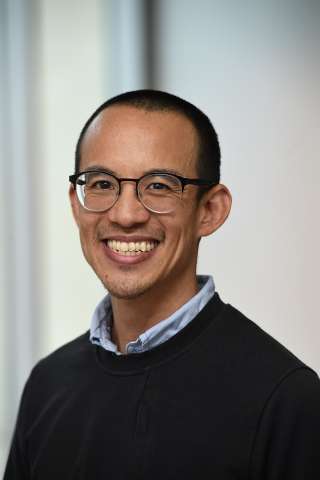
Creating a Culture of Health Equity: Q&A with Bloomberg Fellow Thaddeus Pham
March 11, 2020
Years ago, when Thaddeus Pham read Joan Didion’s essay collection The White Album for the first time, he was struck by the opening line: “We tell ourselves stories in order to live.” How could such a short statement, he wondered, so elegantly encapsulate his own beliefs about how storytelling can shape people’s lives?
Now, as the Viral Hepatitis Prevention Coordinator for the Hawaii Department of Health’s Harm Reduction Services Branch and the co-founder and co-director of the Hep Free Hawaii coalition, Thaddeus is using the power of public health to shape narrative. “The stories of the clients I work with are so easily reduced to caricatures or cyphers, which allows whole systems, including public health infrastructures, to cause them real harm,” he says. With tools including epidemiology, prevention, education, and community engagement, Thaddeus is helping to create a culture that instead promotes equity, justice, and resiliency. His work involves coordinating services statewide for people at-risk or living with viral hepatitis through systems integration and collaboration with public and private partners. We spoke with Thaddeus about his own story and how he’s helping to reshape others’.
What drives you?
I am driven by stories. I believe that we can co-create narratives that have real implications on human dignity, social justice, and community resilience.
How did this bring you to your interest in public health?
I understand the world through narratives. As a son of refugees, as a gay cisgender man, as someone who has witnessed loved ones struggling with addiction and mental health issues, I find that the most genuine way I can understand these identities and experiences is through storytelling. When I started work as an HIV counselor in a free clinic in Honolulu, I witnessed first-hand how honoring and responding to stories is essential to health, both for the individual and the community. Non-judgment, person-centered care, dignity above all: these were the values that led me into public health.
What public-health related work have you done that you’re most proud of?
I am most proud of my work to co-found and co-direct the Hep Free Hawaii coalition. This work is long and complicated and messy, and it is so fulfilling. Our coalition is about creating a culture and community that collectively has been making change on many levels: from increasing direct services to effecting policy change through legislative action. Most importantly, the values of our coalition are grounded in health equity and harm reduction. We always do our work focused on human dignity, regardless of current circumstance or past choices. As such, we use a single issue, hepatitis, as the entry point to address larger social and health issues such as homelessness, mental health, immigrant/migrant/refugee rights, sexual and gender minority healthcare, incarceration, and more.
What question or problem in your community keeps you up at night?
I am most saddened by the dehumanization of people who need a little more support and care. I am appalled by the callous dismissal of the needs and rights of people who are homeless, who use drugs, who are born outside of the U.S., who identify as a sexual or gender minority, who are not white, who are from Native lineage. One of my main concerns borne out of this is the harms inflicted on community health by the structures and systems of public health.
How is the Bloomberg Fellows Program helping you to tackle that problem?
The Bloomberg Fellows Program will provide me with the tools and experience to frame my concerns and questions in an actionable way. The program has been wonderfully responsive to my needs, whether logistical (where is the classroom I am looking for?) to personal (what is my role as a public health professional in the context of Native Hawaiian sovereignty?). As someone who thrives in inter-relational spaces, I appreciate the relationships I have started to build with other Bloomberg Fellows at JHU. It is amazing and inspiring to be part of such an impressive and inspiring network of public health champions across the world.
To return to the storytelling theme, the program will provide me opportunities and skills to better understand and shape narratives that promote health and well-being in the communities I work with, among, and for.
What impact do you hope you to make as a Bloomberg Fellow?
I hope to explore and identify ways to address the impact of public health—as a bureaucracy and a system with entrenched biases—on communities. I hope to reduce the unintended harms of public health on people’s lives and stories.
Tell us something surprising or unexpected about yourself or your work.
Among the communities I work with and among and for in Hawaii, I am oftentimes referred to as the “Queen of Hepatitis.” My other “titles” include “Your Highness,” “Your Majesty,” and “Mother.” I respond to them all. 😊
Connect With Us
Receive all the latest news from the Initiative by signing up for the American Health Dispatch newsletter, subscribing to the American Health Podcast, and subscribing to our YouTube channel.
Contact Us